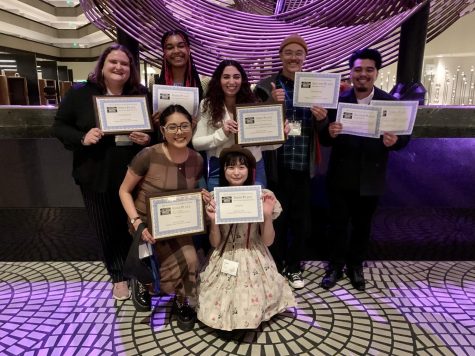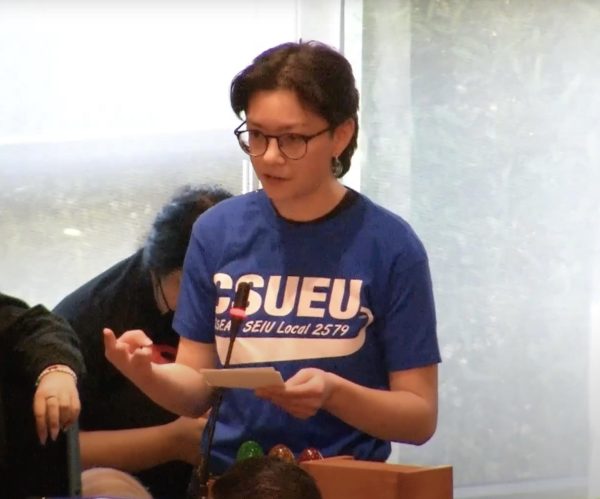Misogynoir is rampant in Hollywood and at the Oscars
Only nine Black women have won the Oscar for Best Supporting Actress. Graphic by Fatima Rosales.
This is an audience-submitted piece that has been edited by the University Times editors to follow AP Style. All views are writer’s own.
The recent casting of Halle Bailey in the live-action remake of The Little Mermaid has some up in arms about Disney’s decision to cast a Black woman in the role of Ariel, who in the cartoon is white. Although Ariel is a fictional character, many felt that because the cartoon was a white character, Disney should have kept the continuity. Yet, to the Black community, the aspect of a live Black Disney princess gave representation not seen yet. Many felt that due to the cartoon being white, the role should have gone to a white actress.
What is misogynoir? It is the hatred, prejudice of, and discrimination against Black women. In Hollywood, this is seen in the blatant disregard for the respect of Black women, in the form of us being given lower roles, lower pay and only winning awards for Best Supporting Actress, but almost never awarded for the main role. It has been seen more frequently in the film and entertainment industry and in the media, especially in our day and age.
Misogynoir has been seen in the entertainment industry for years, almost since the industry itself started. Black actresses have been mistreated, disrespected and devalued for decades. It goes back to Hattie McDaniel. McDaniel was the first Black actress to win an Oscar in 1940 for her role as Mammy in “Gone With The Wind.” Since her win, very few Black actresses have won the coveted award, in fact only nine Black actresses have won the Oscar for Best Supporting Actress. The most recent being Ariana DeBose for “West Side Story.”
In a recent instance, the legendary actress Angela Bassett was recently snubbed by the Oscars after losing the award for Best Actress for her role in “Wakanda Forever,” to Jaime Lee Curtis for her role in “Everything, Everywhere All At Once.” Though both have been in the business for decades, some felt Bassett deserved the honor more because her role was more significant and had more screen time than Curtis’.
Lastly, Jada Pinkett Smith has faced backlash for casting a Black woman as Cleopatra in her new Netflix documentary series, “Queen Cleopatra.” This is an upcoming series that stars a Black actress, Adele James, in the title role made famous by the late actress Elizabeth Taylor in the 1963 movie “Cleopatra.” Although Cleopatra was Egyptian, the country has claimed in an interview with NBC News that “Cleopatra was not Black.”
All of these issues have shown us one thing: misogynoir in Hollywood does exist.
Misogynoir in Hollywood has become extremely prevalent. More and more Black women have been treated unfairly, placed under more scrutiny and even passed up for roles due to the color of their skin. In addition, Black actresses are paid way less than their white counterparts. Actress Sandra Bullock earns a whopping $70 million per film, while actress Viola Davis only earns $25 million per film.
Now, there are some people that may feel Black women are at the forefront of Hollywood’s future, Black women are given good roles all the time, or that Black women win awards all the time for their roles. And yet, the last Black woman to win an Oscar for Best Actress was Halle Berry in 2002 for her role in the critically acclaimed film, “Monster’s Ball.”
She said in a New York Times interview, “The fact that there’s no one standing next to me is heartbreaking.”
Lastly, Black women also face misogynoir by sometimes only being offered roles that are stereotypical roles, such as maids, prostitutes, or negative connotations towards Black women.
Although we are working towards a brighter future for Black women or actresses in Hollywood and surrounding the Oscars, the marathon to get there has been tedious.
One day, Black women and actresses will be enjoyed and celebrated for their work and not just ignored in the background or pushed aside for the public film industry’s acceptance of the masses.

Fatima Rosales is majoring in Graphic Design and Visual Communications. She works for the University Times as Production Manager, designing the newspaper,...







